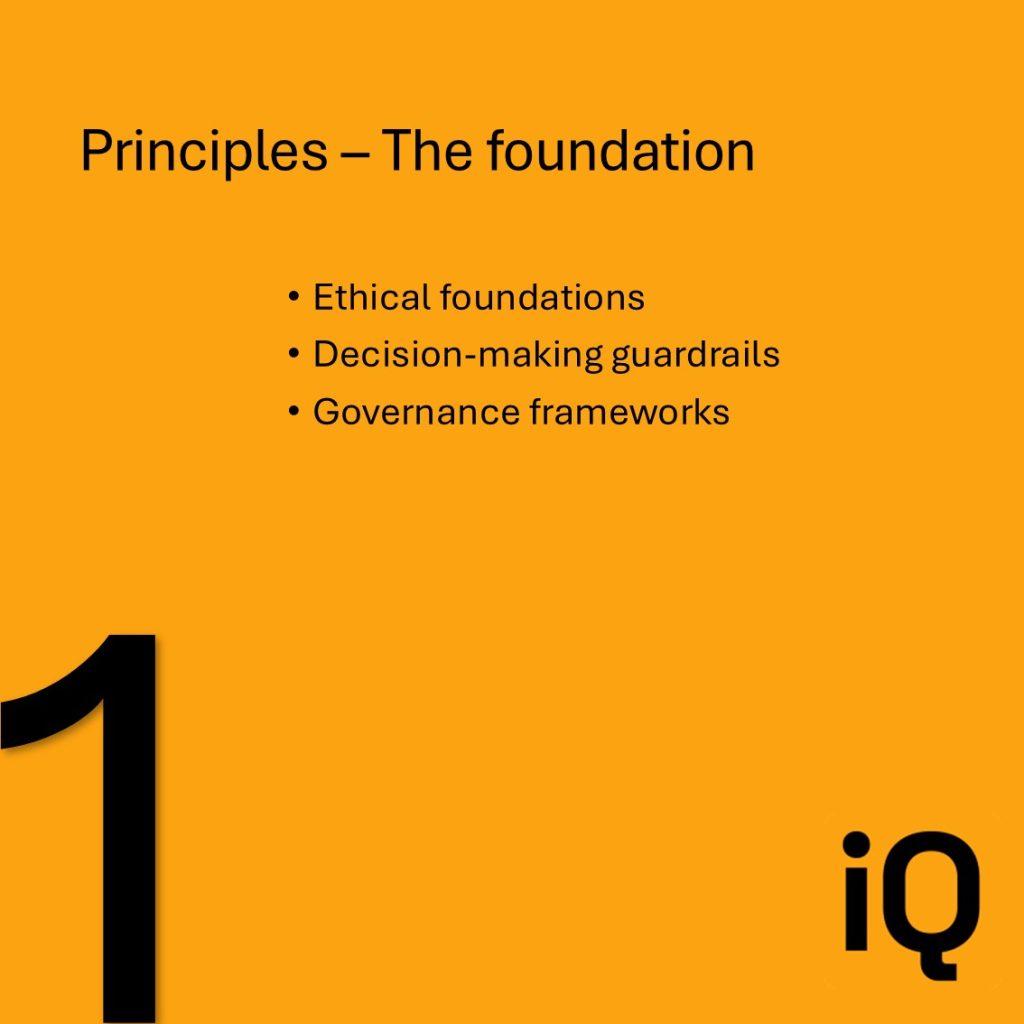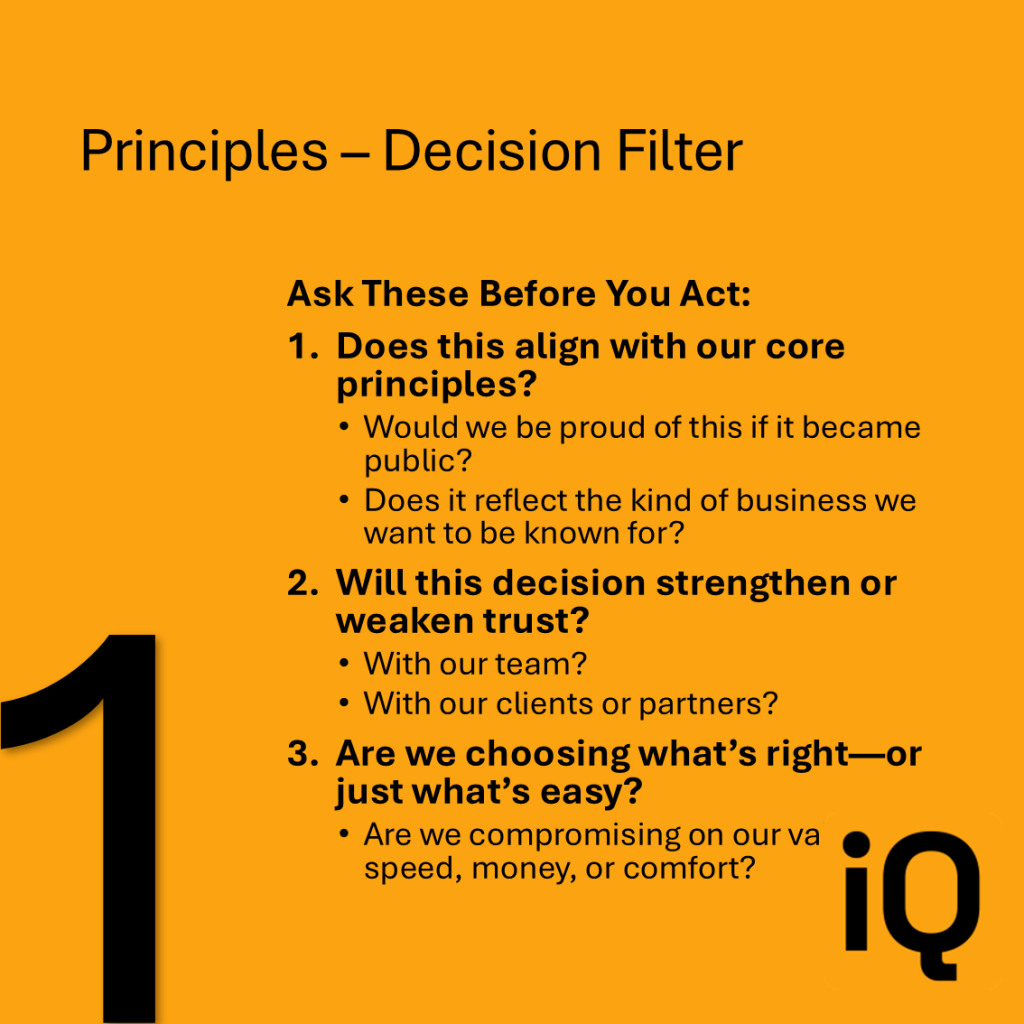


Part 1 of the 6P Framework | By Chris Hogan, ConsultiQ
In every business I’ve worked with—whether scaling, struggling, or starting fresh—there’s always one defining question beneath the surface:
“What do we stand for?”
The answer isn’t your services, logo, or even your goals. It’s your Principles—the deep-rooted beliefs that shape how your business behaves, especially when no one’s watching.
What Are Principles?
Principles are the non-negotiable values that guide your decisions, shape your culture, and influence your impact. They’re not just aspirational statements on a wall—they’re lived commitments that reflect who you are as the founder or owner.
Businesses don’t have principles. People do.
And the business becomes a reflection of those people.
If you’re vague on your principles, you’ll feel it: indecision, inconsistency, trust issues, and culture drift. But when your principles are clear and consistent, you build a foundation that anchors the entire business—especially during growth, change, or crisis.
Why Principles Matter
- They guide decisions when the path isn’t obvious.
- When competing priorities collide, your principles are the filter.
- They shape culture.
- What you tolerate and reward becomes your culture—and that flows directly from your values.
- They build trust.
- Internally and externally, consistency in principle builds confidence. People know what to expect from you.
- They keep profit in perspective.
- Profit matters—but not at the expense of ethics, wellbeing, or long-term purpose.
- Profit matters—but not at the expense of ethics, wellbeing, or long-term purpose.
How to Uncover (or Revisit) Your Principles
Start by asking:
- What behaviours or decisions do I never want to compromise on?
- What really matters to me—especially when it costs more or takes longer?
- What would I want a long-term client or team member to say about how we do business?
It’s often helpful to reflect on your own story: the wins, the burnouts, the mentors, and even the betrayals. That’s where your principles were forged—even if you haven’t named them yet.
Principles in Practice: Real Alignment
Here are a few ways principles show up in healthy businesses:
| If You Value… | You Might… |
| Integrity | Say no to profitable but misaligned deals |
| Transparency | Share context, not just commands, with your team |
| Excellence | Avoid shortcuts, even when clients won’t see them |
| Sustainability | Choose slower growth over high churn |
| Empathy | Design customer and employee experiences with care |
When these values are clear, your operations, culture, and strategy begin to self-align. Decisions are easier. Hiring becomes sharper. Culture becomes more resilient.
Beware of Valueswashing
In a world where every company claims to be “authentic,” “ethical,” or “customer-focused,” it’s easy to fall into the trap of valueswashing—the act of promoting values for marketing or optics, without backing them with real behaviour.
Valueswashing is the business equivalent of greenwashing:
It says the right things but does the opposite.
This happens when:
- A company publishes its values online but acts differently behind closed doors.
- Leadership fails to model the behaviours it expects from staff.
- Staff or clients are punished for challenging decisions that breach the company’s stated values.
- Marketing promotes a social cause that’s not reflected in internal policy or supplier conduct.
Why It’s Dangerous
- It erodes trust. Teams and customers quickly see through the disconnect.
- It invites internal cynicism. When values become a joke or a checkbox, culture deteriorates.
- It damages brand equity. Especially in a connected world where inconsistencies are easy to expose.
The Antidote? Integrity.
You don’t need to be perfect—but you do need to be honest.
- Choose a smaller set of values you’re willing to stand behind, even when it’s inconvenient.
- Be transparent when you fall short—and show how you’re addressing it.
- Don’t claim what you’re not prepared to model.
“Your values are not what you write. They’re what people experience.”
Common Pitfalls
- Generic values.
- “Integrity” means nothing unless you define it with your own tone and behaviours.
- Mismatch between stated and lived values.
- If you preach care but pressure your team into burnout, the disconnect will show.
- Values used only for branding.
- Your website might say “People First,” but your processes say otherwise. That gap erodes trust faster than silence.
Practical Tips for Embedding Principles
- Write them in your voice. No jargon—just honest, personal language.
- Use them to filter key decisions. Hiring, pricing, partnerships, priorities.
- Make them visible. In onboarding, performance reviews, team rituals, and how you celebrate wins.
- Model them consistently. What you do will always speak louder than what you say.
- Revisit them annually. Your principles shouldn’t shift easily—but they can evolve with your maturity as a leader.
Principles and Governance
Strong principles don’t just shape culture—they shape governance.
Governance is the framework by which a business is directed, controlled, and held accountable. It includes the structures, processes, and relationships that guide decision-making, manage risk, and monitor performance. Whether your business has a board or runs as a tightly held company, governance exists—formally or informally—in how decisions are made, who holds authority, and how accountability is maintained.
When embedded into governance, principles ensure that power is exercised ethically, roles are clear, and decisions align with your purpose.
What Good Governance Looks Like:
- Clarity of roles and responsibilities
- Alignment with purpose and values
- Transparent and documented processes
- Checks and balances
- Ethical and strategic oversight
- Consistent behaviour from leadership through to frontline
Good governance is not about control—it’s about clarity, accountability, and integrity.
It’s how your principles show up structurally, not just symbolically.
The Link to the Other 5 P’s
Principles aren’t a silo. They ripple through every other P:
- They give Purpose its integrity.
- They shape how Process is built and run.
- They define what Performance actually means.
- They influence who your People are and how they lead.
- They ultimately sharpen your Perspective on success, growth, and legacy.
Final Thought
You don’t need to be perfect to be principled.
But you do need to be clear, consistent, and willing to live by the values you claim—especially when it’s inconvenient.
Principles are the foundation of a business that lasts.
Everything else is built on top.